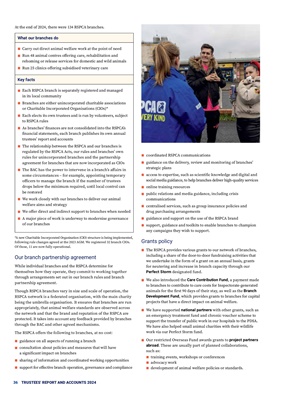
TRUSTEES' REPORT AND ACCOUNTS 2024
36
At the end of 2024, there were 134 RSPCA branches.
What our branches do
• Carry out direct animal welfare work at the point of need
• Run 48 animal centres offering care, rehabilitation and
rehoming or release services for domestic and wild animals
• Run 25 clinics offering subsidised veterinary care
Key facts
• Each RSPCA branch is separately registered and managed
in its local community
• Branches are either unincorporated charitable associations
or Charitable Incorporated Organisations (CIOs)*
• Each elects its own trustees and is run by volunteers, subject
to RSPCA rules
• As branches' finances are not consolidated into the RSPCA's
financial statements, each branch publishes its own annual
trustees' report and accounts
• The relationship between the RSPCA and our branches is
regulated by the RSPCA Acts, our rules and branches' own
rules for unincorporated branches and the partnership
agreement for branches that are now incorporated as CIOs
• The BAC has the power to intervene in a branch's affairs in
some circumstances - for example, appointing temporary
officers to manage the branch if the number of trustees
drops below the minimum required, until local control can
be restored
• We work closely with our branches to deliver our animal
welfare aims and strategy
• We offer direct and indirect support to branches when needed
• A major piece of work is underway to modernise governance
of our branches
*A new Charitable Incorporated Organisation (CIO) structure is being implemented,
following rule changes agreed at the 2023 AGM. We registered 32 branch CIOs.
Of those, 11 are now fully operational.
Our branch partnership agreement
While individual branches and the RSPCA determine for
themselves how they operate, they commit to working together
through arrangements set out in our branch rules and branch
partnership agreement.
Though RSPCA branches vary in size and scale of operation, the
RSPCA network is a federated organisation, with the main charity
being the umbrella organisation. It ensures that branches are run
appropriately, that animal welfare standards are observed across
the network and that the brand and reputation of the RSPCA are
protected. It takes into account any feedback provided by branches
through the BAC and other agreed mechanisms.
The RSPCA offers the following to branches, at no cost:
• guidance on all aspects of running a branch
• consultation about policies and measures that will have
a significant impact on branches
• sharing of information and coordinated working opportunities
• support for effective branch operation, governance and compliance • coordinated RSPCA communications
• guidance on the delivery, review and monitoring of branches'
strategic plans
• access to expertise, such as scientific knowledge and digital and
social media guidance, to help branches deliver high-quality services
• online training resources
• public relations and media guidance, including crisis
communications
• centralised services, such as group insurance policies and
drug purchasing arrangements
• guidance and support on the use of the RSPCA brand
• support, guidance and toolkits to enable branches to champion
any campaigns they wish to support.
Grants policy
• The RSPCA provides various grants to our network of branches,
including a share of the door-to-door fundraising activities that
we undertake in the form of a grant on an annual basis, grants
for neutering and increase in branch capacity through our
Perfect Storm designated fund.
• We also introduced the Care Contribution Fund, a payment made
to branches to contribute to care costs for Inspectorate-generated
animals for the first 90 days of their stay, as well as the Branch
Development Fund, which provides grants to branches for capital
projects that have a direct impact on animal welfare.
• We have supported national partners with other grants, such as
an emergency treatment fund and chronic voucher scheme to
support the transfer of public work in our hospitals to the PDSA.
We have also helped small animal charities with their wildlife
work via our Perfect Storm fund.
• Our restricted Overseas Fund awards grants to project partners
abroad. These are usually part of planned collaborations,
such as:
• training events, workshops or conferences
• advocacy work
• development of animal welfare policies or standards.